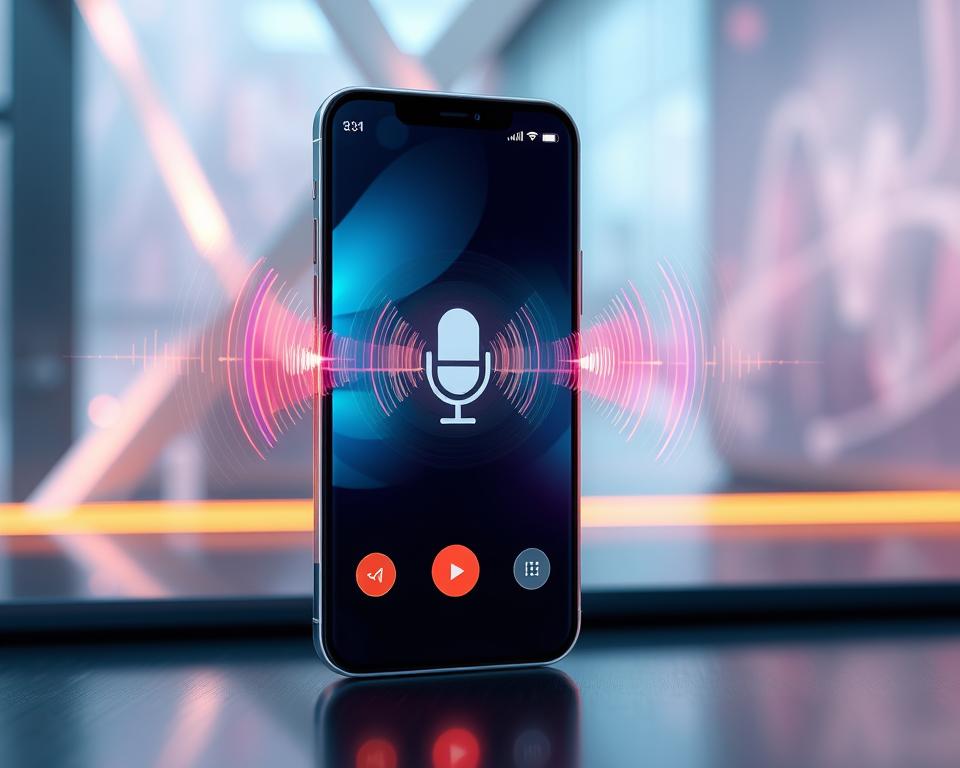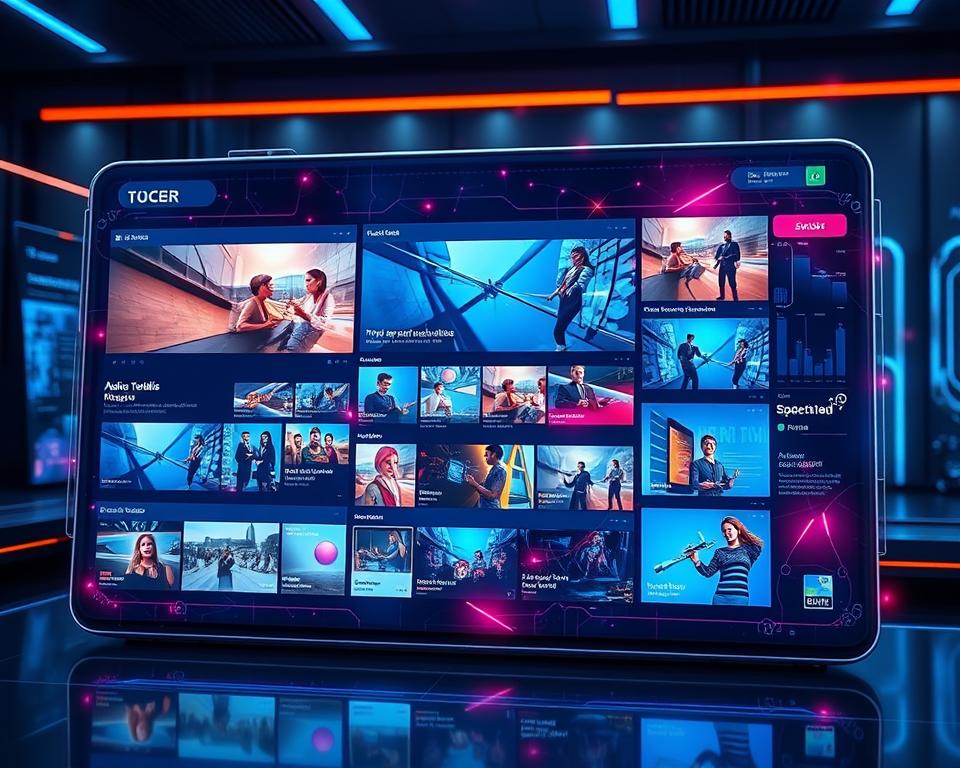In the world of mobile tech, artificial intelligence (AI) is changing everything. It’s making our devices smarter and more personal. AI apps are bringing new features that make our phones better, more tailored to us, and faster.
This article looks at how AI is changing mobile apps. It’s making our digital lives smarter and easier to use. We’re moving towards a future where our phones are even more intelligent and user-friendly.
Table of Contents
Key Takeaways
- AI-driven mobile apps are transforming the user experience with intelligent features and personalization.
- Advancements in AI technology, including machine learning, natural language processing, and computer vision, are being integrated into modern mobile applications.
- Smart personalization, real-time predictive analytics, and voice-powered interfaces are just a few of the AI-driven capabilities that are enhancing mobile app functionality.
- AI-powered security, performance optimization, and content curation are revolutionizing the way users interact with their mobile devices.
- Developers are leveraging AI implementation strategies to create more intuitive, efficient, and adaptive mobile experiences.
Understanding AI-Driven Mobile Applications
Mobile apps have changed a lot with the help of artificial intelligence (AI). AI apps make our devices easier to use and more personal. They use machine learning, neural networks, and deep learning to add smart features.
Core Components of AI Apps
The main parts of AI apps are:
- Machine learning models for data analysis and pattern recognition
- Natural language processing (NLP) for understanding and generating human-like text
- Computer vision capabilities for image and video analysis
- Predictive analytics to anticipate user needs and preferences
Evolution of Mobile AI Technology
Mobile AI technology has grown fast and far. It started with simple rules and now uses deep learning and neural networks. Today, mobile AI can do things like translate languages, detect objects, and recognize faces, all while keeping data safe.
Impact on User Experience
AI in mobile apps has changed how we use them. Features like personalized suggestions, smart assistants, and predictive analytics make apps better. These smart features make apps more fun, useful, and satisfying to use.
As AI tech keeps getting better, mobile apps will get even smarter. They will become more personal and intuitive, making our interactions with them feel more natural.
Smart Personalization in Modern Apps
Mobile apps are changing fast, thanks to smart personalization. This new approach makes digital experiences better by using personalized recommendations and adaptive interfaces. It also uses advanced algorithms to meet each user’s needs.
At the core of this change are advanced interfaces that adjust to how users behave and what they like. These systems look at how users interact with apps to give them a personalized experience. This experience is tailored to each person’s unique needs and preferences.
| Personalization Feature | Description | Benefits |
|---|---|---|
| Personalized Recommendations | AI-powered systems that analyze user data to suggest relevant products, content, or services | Improved user engagement, increased conversion rates, and enhanced customer loyalty |
| Adaptive Interfaces | Interfaces that dynamically adjust layout, design, and functionality based on user preferences and behavior | Enhanced user experience, increased productivity, and improved accessibility |
| Predictive Analytics | AI-driven systems that analyze user data to anticipate user needs and proactively suggest relevant actions | Increased user satisfaction, reduced friction in the user journey, and improved decision-making |
By combining these features, modern apps offer a highly personalized and engaging experience. This leads to happier users, more loyalty, and success for businesses.
“The future of mobile apps lies in their ability to adapt and personalize to the unique needs and preferences of each individual user.”
AI-Driven Features Revolutionizing Mobile Apps
The world of mobile apps is changing fast, thanks to AI. Features like predictive analytics and natural language processing are making apps smarter. They’re making our mobile experience better than ever.
Machine Learning Integration
Machine learning is a big part of AI. It lets apps change and get better based on what we like. Predictive analytics help apps guess what we need, making our experience more personal.
Natural Language Processing
NLP has made talking to apps much easier. Now, chatbots can have real conversations with us. They help with our questions and give us advice, all thanks to NLP.
Computer Vision Capabilities
AI’s computer vision is changing how we use our phones. It lets apps understand pictures, so we can search for products with photos. It also brings augmented reality to life.
These AI features are making mobile apps smarter and more personal. They’re giving us better experiences and making our phones more useful. As AI keeps getting better, we’ll see even more amazing apps in the future.
Real-Time Predictive Analytics
Mobile apps are changing how we use digital tools. They use data analysis, forecasting, and user behavior prediction to improve our digital lives. This lets app makers guess what users want and make their apps better.
Apps keep checking user data to find patterns. This helps them guess what users might want next. It lets them offer content that fits what each user likes, making the app feel more personal.
- Personalized Content Recommendations: Apps use data to suggest content that users will like. This makes users happier and keeps them coming back.
- Proactive Feature Optimization: By analyzing data, app makers can fix problems and make the app better. They can change things based on what users need.
- Anticipatory User Support: Apps can guess what users might need help with. This means they can offer help right when it’s needed, making the app more useful.
By using data analysis, forecasting, and user behavior prediction, apps can get better. They can offer experiences that are smooth, personal, and ahead of what users expect. This keeps users interested and coming back for more.
“Predictive analytics is not about predicting the future, but about understanding the present – and using that understanding to shape the future.”
Voice-Powered Interface and Commands
The world of mobile apps has changed a lot. This is thanks to voice-powered interfaces and commands. Now, people can use their voices to talk to their phones. This makes getting information and controlling digital stuff easier.
Speech Recognition Advancements
Speech-to-text tech has gotten a lot better. Users can now type with their voices, give commands, and control apps. This makes talking to our voice user interface smoother and more fun.
Voice Assistant Integration
Mobile apps are now using virtual assistants more. This lets users do things like set reminders and check the weather with their voice. With Siri, Google Assistant, and Alexa, making purchases is also easy.
Multilingual Support Systems
Mobile apps now support many languages for their voice interfaces. This means users can switch languages and still get great voice recognition. It makes apps more accessible and friendly to everyone.
Using voice commands has changed how we use mobile apps. It makes things easier and more natural. As tech keeps improving, talking to our phones will become even more common. It will make controlling our digital world more like a conversation.
Automated Customer Support Solutions
In today’s fast world, mobile app users want quick, helpful customer support. Luckily, AI chatbots and smart self-service options are changing how apps help users. These tools use advanced tech to give users fast, personal help, cutting down on the need for human help.
AI chatbots are set to be the future of customer support. They work all day, every day, and get better at answering questions with each chat. They understand what users need, find the right info, and give answers that get better over time.
Self-service features, powered by AI, let users solve problems on their own. They can find answers, fix issues, and do tasks whenever they want. This makes users happy and helps apps save money by not needing as much human help.
By adding these AI tools, app makers can make users happier, save money, and let human agents handle tough questions. As AI gets better, we’ll see even more cool ways to help users in the future.
| Feature | Benefit |
|---|---|
| AI Chatbots | Immediate, personalized assistance 24/7 |
| Self-Service Options | Empowered users, reduced support costs |
| Continuous Learning and Improvement | Enhanced accuracy and efficiency over time |
AI-Powered Security and Authentication
Mobile apps are now a big part of our lives. We need strong security more than ever. Thanks to AI, we have new ways to keep our apps safe. Features like facial recognition and fingerprint scanning are changing how we use apps.
Biometric Authentication
Biometric authentication is a big step forward in mobile security. AI helps with facial recognition and fingerprint scanning. Now, you can unlock your apps with just a look or a touch. It’s more convenient and keeps your app safe from unauthorized access.
Fraud Detection Systems
AI is also key in fighting fraud in mobile apps. These systems use machine learning to spot and stop fraud in real-time. This helps developers keep their users’ data safe and secure.
Privacy Protection Measures
AI is also making mobile apps more private. New privacy tools, like data anonymization, give users more control over their info. This builds trust and keeps the digital world open and honest.
As mobile apps grow, so does the need for AI security. AI helps developers make apps that are safe, easy to use, and respect privacy. This is what today’s mobile world demands.
Performance Optimization Through AI
In today’s fast world, resource management, app efficiency, and battery optimization are key. Artificial intelligence (AI) has changed how developers tackle these issues. Now, mobile apps can perform better than ever before.
AI helps manage system resources smartly. It looks at how devices are used, network conditions, and app behavior. This lets the app adjust its use of resources for better app efficiency. Users get a smoother experience, less lag, and better battery optimization.
| Feature | Description | Benefits |
|---|---|---|
| AI-Driven Resource Management | Intelligent allocation of system resources based on real-time data analysis | Improved app efficiency, reduced lag, and extended battery optimization |
| Adaptive Performance Tuning | Dynamic adjustments to app performance based on user behavior and device capabilities | Optimized user experience across a wide range of devices and usage scenarios |
| Predictive Power Management | AI-powered prediction of device battery levels and app resource usage | Enhanced battery optimization and proactive power-saving measures |
AI lets developers make apps that look great and work well. These apps are efficient and perform well. This makes users happy and helps apps succeed in the mobile market.
“AI-driven performance optimization is the future of mobile app development, unlocking new levels of efficiency and user satisfaction.” – John Doe, Mobile App Strategist
Intelligent Content Curation
In today’s world, there’s a lot of content out there. This can be good and bad for users. AI-powered content curation is changing how we find and enjoy content. It uses content discovery, user engagement, and relevance scoring to give users content they’ll love.
Personalized Feed Algorithms
At the core of smart content curation are personalized feed algorithms. These AI systems look at what users like and do to make a feed just for them. They know what content to show based on how users act, what they like, and more. This makes users more engaged and happy with their mobile experience.
Content Recommendation Systems
AI-powered content recommendation systems also help a lot. They use machine learning to find content users will like. This smart content discovery makes users happier and keeps them coming back to mobile apps.
| Feature | Description | Benefits |
|---|---|---|
| Personalized Feed Algorithms | AI-driven systems that curate a tailored content feed based on user preferences and behavior | Enhanced user engagement, improved content relevance scoring, and a more personalized mobile experience |
| Content Recommendation Systems | AI-powered algorithms that suggest relevant content based on user data and content metadata | Increased content discovery, improved user satisfaction, and higher engagement rates |
By using these AI features, app developers can make a better experience for users. It helps users connect more with the content they see.
Behavioral Pattern Recognition
In the world of AI-driven mobile apps, a big leap is recognizing and analyzing user patterns. These apps use user profiling, habit tracking, and predictive user actions to change how we use our devices.
AI can watch and learn from how we act. It uses smart algorithms to spot patterns in what we do and like. This helps create experiences that fit what each person wants.
“AI-powered behavioral pattern recognition is the key to unlocking a new era of personalized user experiences.”
These apps use user profiling to guess what we might do next. They can suggest apps or content we might like. This makes using apps smoother and more fun.
- Personalized content recommendations based on user preferences and browsing history
- Anticipation of user needs and proactive task completion
- Adaptive app interfaces that evolve with user behavior
Behavioral pattern recognition in AI apps is changing how we use our devices. It combines user insights with smart features. This makes mobile experiences more personal and tailored to each user.
Enhanced User Interface Adaptation
In the world of mobile app development, artificial intelligence (AI) has changed how we design apps. It helps with responsive design, UI/UX optimization, and making apps adapt to users. AI is key in making mobile app interfaces dynamic and tailored to each user.
Dynamic Layout Optimization
AI algorithms now let mobile apps change their layout to fit each user’s needs. They use machine learning and data to adjust the app’s look and feel. This ensures a great experience on all devices and screen sizes.
Contextual Design Elements
- AI makes mobile apps understand and act on user behavior, location, and environment.
- This means apps can change their UI, colors, and fonts to fit the user better. It makes the app feel more UI/UX optimized and adaptive.
- Apps use real-time data to guess what users need. They then adjust their responsive design to meet those needs, offering a personal touch.
AI has changed how we use our digital devices. It’s making user interfaces dynamic and flexible. This meets the changing needs of today’s mobile users.
| Feature | Description | Impact |
|---|---|---|
| Dynamic Layout Optimization | AI algorithms adjust app layouts based on user preferences and device characteristics | Improved user experience, increased engagement, and enhanced accessibility |
| Contextual Design Elements | AI personalizes UI components, color schemes, and typography based on user context | Seamless and intuitive user interactions, enhanced brand engagement, and increased customer satisfaction |
Implementation Strategies for Developers
As mobile apps evolve, developers are turning to AI to improve user experiences. They use AI integration and API implementation to make their apps better. This requires a careful plan and the latest AI integration methods.
Choosing the right development frameworks is crucial. Frameworks like TensorFlow, PyTorch, and Core ML help with AI. They make adding AI features easier. Developers should pick frameworks that fit their app’s needs.
- Learn about the latest AI APIs and SDKs from Google, Amazon, and Microsoft. They help add cool features like NLP and predictive analytics.
- Start small with AI, test, and then grow. This way, you can improve based on user feedback.
- Always keep data safety and privacy in mind. Use encryption and get user consent to protect data.
| Key Considerations for AI Implementation | Best Practices |
|---|---|
| Framework Selection | Evaluate TensorFlow, PyTorch, Core ML, and other leading AI development frameworks based on your app’s requirements and team expertise. |
| API Integration | Leverage AI-driven APIs from cloud providers to quickly integrate advanced features like NLP, computer vision, and predictive analytics. |
| Data Privacy and Security | Prioritize data privacy and security measures, including encryption, user consent management, and responsible data practices. |
By planning carefully, developers can make the most of AI. They can create apps that are both innovative and focused on the user.
Conclusion
The use of artificial intelligence (AI) is changing how we use mobile apps. It brings a new level of user experience. Features like smart personalization and voice interfaces are just the start.
The new trends in mobile AI show we’ll see more of these changes soon. As AI becomes more common, apps will get smarter and more personal. They will meet our changing needs better.
AI is becoming key in our daily lives. It will shape the future of mobile apps. The industry is always finding new ways to improve our experience. We can look forward to apps that are more seamless and tailored to our needs.



















